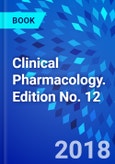'The very last thing a drug regulator wishes to be able to say is, like Lord Byron (1788-1824), on the publication of his poem Childe Harold's Pilgrimage, 'I awoke one morning and found myself famous.'
The twelfth edition of this long-established textbook of clinical pharmacology (first published in 1960) continues its fine tradition of balancing science and practice for improved evidence-based drug therapy and good prescribing in therapeutic settings increasingly complicated by intercurrent disease and polypharmacy.
- Coverage of all major therapeutic topics by body system.
- Introductory sections give brief chapter synopses.
- Case studies where relevant.
- Covers the needs of the developing world with a focus on practical prescribing and health technology assessment.
- Definition, tips, brief explanation boxes throughout.
- Interesting histories, etymologies and provenances of terms throughout.
- Entertaining footnotes throughout.
- Fully updated throughout.
- New co-editor: Fraz Mir, Addenbrooke's Hospital and Department of Medicine, University of Cambridge.
- Now with free e-book on StudentConsult.
Table of Contents
Section 1: General1 Clinical pharmacology
2 Topics in drug therapy
3 Discovery and development of drugs
4 Evaluation of drugs in humans
5 Health Technology Assessment
6 Regulation of medicines
7 Classification and naming of drugs
Section 2: From Pharmacology to Toxicology
8 General pharmacology
9 Unwanted effects and adverse drug reactions
10 Poisoning, overdose, antidotes
11 Drug dependence
Section 3: Infection and Inflammation
12 Chemotherapy of infections
13 Antibacterial drugs
14 Chemotherapy of bacterial infections
15 Viral, fungal, protozoal and helminthic infections
16 Drugs for inflammation and joint disease
17 Drugs and the skin
Section 4: Nervous System
18 Pain and analgesics
19 Anaesthesia and neuromuscular block
20 Psychotropic drugs
21 Neurological disorders - epilepsy, Parkinson's disease, and multiple sclerosis
Section 5: Cardiorespiratory and Renal Systems
22 Cholinergic and antimuscarinic (anticholinergic) mechanisms and drugs
23 Adrenergic mechanisms and drugs
24 Arterial hypertension, angina pectoris, myocardial infarction and heart failure
25 Cardiac arrhythmia
26 Hyperlipidaemias
27 Kidney and genitourinary tract
28 Respiratory system
Section 6: Blood and Neoplastic Disease
29 Drugs and haemostasis
30 Cellular disorders and anaemias
31 Neoplastic disease and immunosuppression
Section 7: Gastrointestinal System
32 Oesophagus, stomach and duodenum
33 Intestines
34 Liver, biliary tract, pancreas
Section 8: Endocrine System, Metabolic Conditions
35 Adrenal corticosteroids, antagonists, corticotropin
36 Diabetes mellitus, insulin, oral antidiabetes agents, obesity
37 Thyroid hormones, antithyroid drugs
38 Hypothalamic, pituitary and sex hormones
39 Vitamins, calcium, bone








